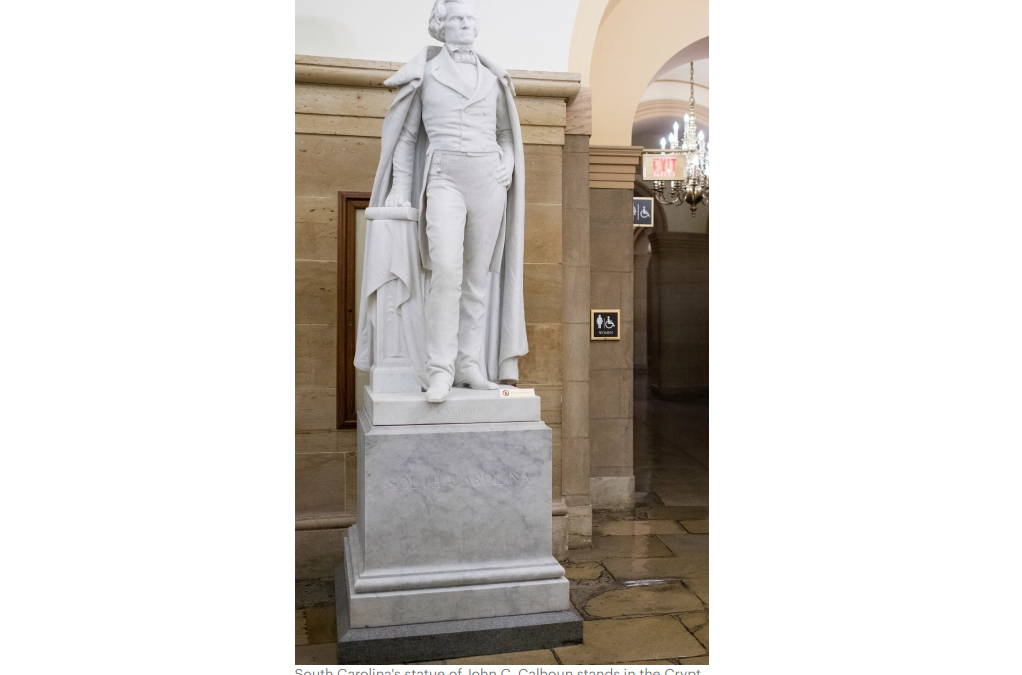For the second straight year, the House voted to remove the bust of the late Chief Justice Roger B. Taney — who authored the infamous Dred Scott decision that held Black people were not U.S. citizens — along with statues and busts of Confederates and white supremacists.
The final vote on Tuesday was 285-120. Sixty-seven Republicans joined 218 Democrats to vote for the measure. The 120 no votes were all Republicans. No Democrats voted against the measure.
Taney would be replaced by another Marylander in the Old Supreme Court Chamber of the Capitol: Thurgood Marshall, the first Black Supreme Court justice. The measure, introduced by House Majority Leader Steny H. Hoyer, D-Md., would also remove the statues and busts of people who voluntarily served in the Confederacy and other white supremacists, such as John C. Calhoun, a former vice president.
“What we should do today is relegate these statues to the dustbin of history,” Majority Whip James E. Clyburn said. The South Carolina Democrat noted that he met his late wife in jail after protesting racial inequities.
Clyburn rhetorically asked why his home state in 1910 sent to the Capitol a statue of Calhoun.
“Simply because he was this nation’s foremost proponent of slavery,” Clyburn answered.
House Republican Leader Kevin McCarthy, who supported the bill, used his floor remarks to imply the Democratic Party is racist, due to its past ties to racism.
“But let me state a simple fact: All of the statues being removed by this bill are statues of Democrats,” the California Republican said, leaving out the context that the modern two-party system does not compare neatly to the political dynamics of the antebellum period and late 19th century.
McCarthy also noted that President Joe Biden and Speaker Nancy Pelosi have in the past praised the late West Virginia Sen. Robert C. Byrd, a former Ku Klux Klan member. He also took aim at critical race theory.
“Today the Democratic Party had doubled down on what I consider this shameful history by replacing the racism of the past with the racism of the critical race theory,” McCarthy said.
Congress authorized the National Statuary Hall Collection in 1864 to allow each state to donate two statues of notable citizens “illustrious for their historic renown or for distinguished civic or military services” for display in the Capitol.
In 2000, the law was changed to allow states to ask the Joint Committee on the Library of Congress to approve a replacement — if the request has first been backed by a resolution adopted by the state’s legislature and governor. The statue up for replacement must have been displayed in the Capitol for at least 10 years; the committee can waive the requirement for cause at a state’s request.
In 1931, Mississippi donated the statues of Confederate President Jefferson Davis and Confederate Col. James Z. George to represent it. Both men represented Mississippi in the Senate, but neither of them was a native Mississippian. Davis was born in Kentucky, and George was born in Georgia.
Charles B. Aycock of North Carolina, Calhoun and James Paul Clarke of Arkansas, although not members of the Confederacy, were white supremacists, and representations of them would be subject to removal under the bill.
Other statues that would also be subject to removal from the collection because of their subjects’ ties to the Confederate States of America include Wade Hampton (South Carolina), John E. Kenna (West Virginia), Uriah Milton Rose (Arkansas), Edmund Kirby Smith (Florida), Alexander Hamilton Stephens and Crawford W. Long (Georgia), Zebulon Baird Vance (North Carolina), Joseph Wheeler (Alabama) and Edward Douglass White (Louisiana).
Several of the aforementioned statues, including those of Aycock, Clarke, Smith and Rose, are already in the process of being replaced at the state level.
“It’s time, Mr. Speaker, to remove those symbols of slavery, segregation and sedition from these halls,” Hoyer said.
–rollcall.com



